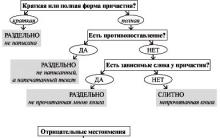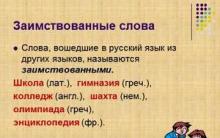Errors in spelling not with participles are explained not by ignorance of the rules, but by the inability to distinguish participles from adjectives. The most important grammatical information about participles is given in § 20-- 23. Mastering them is the main condition for acquiring stable spelling skills not with participles and adjectives.
Not with short participles
With short participles, as well as with other verbal forms (indefinite form, personal forms, imperative forms, gerunds), the particle is not written separately: the article is not written; the novel has not been read; the plan was not fulfilled; the letter was not delivered; not a word is said; the table is not set; All the houses are flattened, have not been plastered for a long time, the roofs are not painted, the shutters are closed (Ch.); The path is not beaten, not measured, but it always leads to spring (Alig.); However, the concert was still not over, or, rather, not started (Bazh.).
Notes: 1. Participles are not written together with short forms if the short form is formed from a verb with the prefix nedo-: the plan is not fulfilled; the novel is underrated by critics; What you [Siberia] lacked is a song born here (Tv.); She is smart, but her mind is undereducated (Ch.); In this case, the oil is saturated (gas). But: Many things were not completed in previous years (Prov.) - the participle is formed from the verb to finish ("finish, bring to the end").
2. It is necessary to distinguish between short forms of participles and short forms of adjectives that arose on the basis of participles; cf.: The wine has not been aged for the required period. - The girl is uncontrollable, capricious; A group for studying a foreign language was never formed. - The girl was, although uneducated, but smart; His ideas of happiness are not limited to the narrow world of the family. - Unlimited and boundless is the happiness that a person draws from the fullness of his growing spiritual powers (A.T.). Short forms of participles with the particle not and short forms of adjectives with a prefix cannot be distinguished, firstly, by meaning (the adjective always has a different meaning), and secondly, by asking grammatical questions (the adjective answers the questions “what?”, “ what?”, “what are they?”, but these questions cannot be asked for the participle). In addition, passive past participles control the instrumental case of the doer, while adjectives are not combined with the instrumental case form.
3. Words like invulnerable, unfading, unshakable are adjectives (not participles!; see below for details).
Not with full participles
With full forms of participles it cannot be written both together and separately.
1. A particle not with a participle is written together:
1) if the participle is formed from a verb that is not used without: hater, hated (to hate); unwell (to be unwell); perplexed (perplexed);
2) if the participle is formed from a verb with the prefix under-: Autumn sent to the earth its cool sun, which had not been given over the summer (Poch.); Needless to say, how glad I was for the opportunity... to rediscover a poet who was underestimated in his time (Ryl.); Sleep, misunderstood by me, sleep!.. Sleep, unloved, sleep... (Meadow);
3) if there are no explanatory words during the sacrament; in the absence of explanatory words, not with the participle form a single semantic whole, therefore the possibility of synonymous replacement is created (the synonym is often in the sentence itself): Vronsky also stood up and, in a bent, unstraightened state, looked at him from under his brows (L. T.); He [I.] had many desires that originated in childhood. Ilf] carried through life fresh, unextinguished (Ol.); Your simple appearance will be captured with stainless, immortal steel (Berg.). Wed. Also:
The sleep-deprived girls stood nearby, yawning intermittently... (Ch.) - the participle can be replaced with the synonym sleepy
You give such rich food to the imagination with a few insignificant strokes... (Bl.) - the participle can be replaced with simple, ordinary synonyms
The first ten hours passed in an incessant struggle with the continuous chaos of waves (gas.) - the participle can be replaced with synonyms for constant, incessant
The hay, piled up wet, rotted in the stacks; He hurriedly stares at himself with his not-dry clothes (TV) - participles can be replaced with synonyms damp, wet
Notes: 1. The combination “e-|-single parable.” is not easy to replace with a synonym: many individual formations are created in a language, for which it is by no means easy to find a synonymous variant. Therefore, remember: the absence of explanatory words during the participle in most cases requires continuous writing not with the given participle (a new word is created).
The commander, who has not slept for a long time, looks at the storm crests (Oisl.) - there is an explanatory word, it is impossible to replace the participle with a non-synonym
At this time, Duroc saw me and, leaving the conversation, approached with a meaningless look (Green) - there is an explanatory word, it is impossible to replace a participle with a non-synonym
The rain that did not stop during the day washed away all the crossings - there are explanatory words, it is impossible to replace the participle with a non-synonym
With difficulty I pulled on clothes that had not dried overnight - there are explanatory words, it is impossible to replace a participle with a non-synonym
2. In the absence of explanatory words, separate writing not with participles is possible in two cases: 1) in contrast: With all my soul I suddenly felt in her not just a girl, but a tragic heroine of some genuine, not fictitious... future novel (Cat .); 2) with a logically emphasized negation: I did not see Efremov not in a hurry (St.).
4) if the explanatory words in the participle are quantitative adverbs almost, partly, very, quite, much, completely, completely, very, absolutely, too, extremely, completely, to the highest degree, etc.: almost ^edited manuscript; a completely undeveloped area; a highly unjustifiable statement; extremely unreasonable decision; There are connections between people that are perfectly expressed (Bl.); You will sail through vast, completely unexplored spaces (gas); Then the prosecutor... inspected the barbed wire, which remained almost untouched (Neil). But if in a sentence, in addition to adverbs of degree, there are other explanatory words, then it is not written separately with the participle: His white body, completely untouched by the tan, deathly shines through the layers of water (Mushroom) - here the adverb completely strengthens the negation; replacing a phrase untouched by a synonym (or synonymous phrase) “destroys” the sentence.
Note. If with the participle there is an adverb at all or its synonym at all (colloquial), then not with the participle can be written both together and separately. Integrated writing is possible if absolutely, completely have the meaning “completely, absolutely” and strengthen the new meaning that the participle acquired in combination with not: And now... [Mayakovsky] followed Nora Polonskaya into the dark, completely unlit staircase (Cat.) - “to a dark, completely (absolutely) unlit staircase”, the adverb can be replaced with the word at all; And so, completely unprepared, you introduced me into your circle (Ostr.) - “completely (absolutely) unprepared”; ...Some dishes therefore cooled down, while others were accepted completely untouched (G.) - “completely (completely, absolutely) untouched.”
If the adverbs absolutely, completely emphasize that the phenomenon is not one of those called a participle without not, the particle with the participle is written separately: not a fictional story at all, not a fictional story at all.
2. A particle not with a participle is written separately if there are explanatory words (not quantitative adverbs) with the participle: There is a thimble on the table, a stocking not finished by the old woman (Ch.); All this is poetry, not published anywhere and written in one gulp these days (Bl.); Apart from this openly unexpressed dissatisfaction, in all other respects they got along well with Korovin (E.M.); He wrote a book that has not been published for almost thirty years (Pcs.); Nothing goes unnoticed on the screen: not a single psychologically justified experience, facial expression, not a single unjustified gesture (A. Lev.; unjustified is written together because there are no explanatory words; not a single one refers to the noun gesture).
Notes: 1. Participles with explanatory words and the particle not should be distinguished from adjectives with the prefix not, which arose on the basis of the corresponding participles; cf.: student construction teams that are not organized at the right time - a person who is disorganized in their work (“loose, unorganized, undisciplined”); children who cannot stand up to quarantine are comrades who cannot stand up to arguments (“they do not know how to control themselves, they are quick-tempered, they are hot-tempered”); a school building not prepared for the beginning of the school year - a student unprepared in physics (“poor knowledge of physics, lagging behind in physics”); an engineer who fails to complete a project on time is a student who fails in the Russian language ("lagging behind in the Russian language"). As you can see, adjectives with do not have “their” meaning and even if there are explanatory words, they are easily replaced by synonyms (which is impossible to do if there are explanatory words with the participle). Passive participles and similar adjectives also differ grammatically. Passive participles control the object in the form of the instrumental case: student construction teams not organized (by whom?); an unprepared (by whom?) school building. With adjectives, the instrumental case is impossible - you cannot say: “a person unorganized (by whom?) in work”; “an unprepared (by whom?) student” (meaning “lagging behind, poor in knowledge”).
The particle not with adjectives (such as disorganized, uncontrolled, unprepared, unsuccessful) is written together or separately according to the rules for writing not with adjectives (see below). Here we just note that of all the explanatory words that are possible with them, the need to write separately is indicated by explanatory words starting with neither (negative pronouns and pronominal adverbs), as well as far, by no means and at all, at all ("by no means") : not at all (at all) a self-controlled person, in no way (at all) a prepared student.
2. The rule about separate writing not with participles in the presence of explanatory words does not apply to participles that have turned into adjectives and which, when added to a particle, did not receive a new meaning: unprecedented (“unusual, amazing, exceptional”), invisible (“hidden from sight, inaccessible to sight"), unforgettable ("memorable"), uninhabited ("desert, without population"), unheard of ("amazing, unprecedented"), etc. Unlike passive participles, these formations do not control nouns or pronouns in form of the instrumental case [you cannot say: “an island inhabited by people,” “an event forgotten by us (me), “a miracle we saw”].
Integrated or separate spelling not with similar words is regulated by the rules of writing not with adjectives. In practice, not with similar words is written separately only in one case - if words with neither (negative pronouns and adverbs, as well as the repeated conjunction neither...nor) act as explanatory words: A wonderful, never-before-seen sight enchants me (Kupr .). With other explanatory words, not with former participles, it is written together: And I myself am invisible to the enemy’s eye (Alig.); Stars, previously invisible, sparkled in the telescope's field like unknown worlds; At about the same hour... below, near the shore, invisible from Voropaev’s position, a machine gun began to groan (P.P.).
3. The rule about separate writing not with participles in the presence of explanatory words does not apply to the widely used adjectives in the language (complicated, as a rule, by the particle not), which are externally similar to passive participles in the present tense form: unimaginable noise, irreparable mistake, insurmountable obstacle, endless conversation, unbearable heat, irreparable loss, invaluable service, elusive difference, indomitable hatred, unshakable confidence, independent person. Adjectives in -my are formed directly from verbs and never act as participles. Therefore, they are not combined with the instrumental case form (it is impossible to pose the questions “by whom?”, “With what?”). Many similar adjectives cannot be used without them: unimaginable, indelible, inexhaustible, inescapable, indestructible, unbending, incombustible, endless, unbearable, etc.75. Others, although in rare cases, are used without notation: For me, the future Russia as a great democracy is conceivable and acceptable (Bl.); Everything is discernible, close, as if it had already been found (Bl.).
Adjectives on -my (both in full and short form) are written separately from not, if the sentence contains explanatory words starting with ni: incomparable vision of mountains (Bl.); A star flies by unheard of by anyone (Inb.); Signs of the road to you that are not visible to anyone (TV). But: As if from a distance he was in imminent danger (Alig.) - the adjective without is not used. With other explanatory words, as well as in the absence of explanatory words, adjectives in -my are written with a continuous flow: Water, like other liquids, is practically incompressible; The life path of Shchepkina-Kupernik is inseparable from the theater; Various fats... contain substances that are essential for the body.
Below are comments on the combined and separate spellings of particles not with verbal forms:
1. The possibilities for the classical operatic form are not exhausted and inexhaustible (gas.) - the short form of the participle is exhausted (controls the instrumental case) is written with not separately; the short form of the adjective na -my (does not control the instrumental case) with is not always written together, except in those cases when the explanatory words are words starting with neither, or far, not at all, and also completely, at all in the meaning “by no means.”
2. In her beautiful features there was something unfinished, unexpressed; they lacked one spark, one blow with a chisel... (Hertz.) - single participles, unfinished, unspoken can be replaced with synonyms; lacked is the past tense form of the verb lack.
3. On the streets that had not been swept for a long time, the wind rustled the fallen leaves - a participle with an explanatory word (not a quantitative adverb).
4. Human memory has the as yet inexplicable property of forever imprinting all sorts of trifles (Cat.) - the adjective (does not control the instrumental case) can be replaced with synonyms strange, unusual.
5. A familiar world appeared on the canvases, but there was something of its own in it, not conveyed by meager human words (Paust.) - a communion with explanatory words.
6. Ice and icy soil are practically impenetrable (gas) - the adjective form is in -my (does not control the instrumental case), the explanatory word is practically not taken into account.
7. But the plans that Turgenev originated in Spassky, but which remained unfinished or completely unfulfilled, were many (gas.) - participle of the verb to bring with explanatory words; unfulfilled - the participle functions as an adjective, the adverb of degree has the meaning “completely”.
8. Cold, autumn rain rained down on us from above, not stopping for a minute (Isa.) - communion with explanatory words. v 9. Alka’s bed stood still untouched - a single communion; is still a particle that enhances the meaning of the word untouched.
"Not" with different parts of speech.
Together or separately?
In order for students to understand and successfully master a new spelling topic, the teacher must first of all show the internal logic of the laws of Russian spelling, make these laws understandable, familiar and simple. The means may vary. This is especially true for the moments of practicing and consolidating new knowledge. Tables (ready-made or thought out by the teacher, “tortured” by him - and therefore the best), algorithms, entertaining and educational tasks, and games are also suitable here.
Visualization and “entertainment” should not be neglected in high school, so that Russian language lessons do not turn into a dreary repetition of what was supposedly studied in the 6th and 7th grades, but is completely forgotten by the majority, and is perceived by many simply as a new revelation .
I. Didactic material from various manuals helps the teacher when studying and repeating the topic « Not with different parts of speech." The main writing principle that schoolchildren must learn here is:
Particle Not , written separately, expresses the negation of a sign or action.
Console Not-, written together, it only says that the object has the opposite quality, sign or effect.
Based on this principle, you can combine numerous rules into simple schemes:
Particle Not written separately: – with verbs(was not),with gerunds(leisurely),with numerals(not once), and with short adjectives with a hint of obligation (he is not needed - not required, not obliged - does not want); – with all words, if they have or are implied contrast with union A (Not deep, A small river), as well as with intensification denial words far from, not to anyone, not at all, not at all, not at all(not at all happy faces); – with adjectives in comparative degree(not thinner); – in words with prepositions(Not with whom, Not in spirit Not for whom, Not in force). |
Not written together: - in words that are without Not not used (Not vezha, Not conquerable); – in words that give a qualitative description of the subject and which can be replaced with a synonym (Not friend - enemy, very Not healthy look - very sick look, Not healthy – sick); – in verbal adjectives -washed (Not dependent); – V indefinite pronouns (Not Who, Not What, Not which); – V verbs with prefix under-, giving the verb the meaning of incompleteness, lack of action (under do , under evaluate). |
The same writing principle applies to participles:
Full participles with a particle Not are written apart, if there – dependent word: Not redeemed nobody lights; – contrast with union but not repaid, A lit lights. Not with participles -my written separately, if available dependent word in creative case: Not visible(adv.) eye, But invisible(adj.) tears to the world. |
If there is no dependent word or contrast with a conjunction A, then the particle Not is written together: Not the extinguished lights glowed dimly in the fog. WITH short participles particle Not is written always separately: lights Not repaid. |
II. You can present these rules in the form of a simple table (7th grade level).
Not with different parts of speech |
||
Part of speech |
Together |
Apart |
| Noun, adjective, adverb -o, -e | 1. Not to be used without Not-: sissy, ridiculous, ridiculous 2. Can be replaced with a synonym without Not-: Not modestly (boastfully) Not stupid (smart) 3. In negative adverbs: Not Where , Not Where |
1. There is a contrast: Not Truth , A lie 2. Denial is reinforced by words far, not at all, not at all, never: far Not silly 3. With adverbs not on -o, -e: Not comradely |
| Pronoun | After Not And neither no preposition: neither whom , Not whom |
After Not And neither there is a preposition: Not who , nor who |
| Verb, gerund |
Not harass (not used without -Not ) Not harassing(not used without -Not ) |
Not noticed (verb) Not noticing(gerund) |
| Participle | There is no dependent word or opposition: Not finished work |
1. There is a dependent word: Not finished during Job 2. There is a contrast: Not finished, A work started 3. With short participles: Job Not finished |
III. Words that are without Not are not used.
| Nouns | Adjectives | Verbs |
stranger fury ignoramus, ignoramus absurdity, absurdity hatred bad weather fidget dislike stainless steel (steel) slob, sloppiness lob Nesmeyana (princess) foolish nonsense clumsiness penalty a lack of uncleanness tawny owl (grass) |
frantic unsightly unsociable hated stormy restless impenetrable (darkness) unsightly (action) hostile unlucky sloppy countless (quantity) awkward clumsy merciless (swearing) |
be indignant be perplexed lack (something) overlook (behind the child) miss (Sveta) dislike hate go on a rampage I'm not feeling well he's itching you're in trouble |
IV. Simplified version of the rules:
V. We work with algorithms.

VI. Developmental tasks.
1. Reaction speed task(good to do after a long time of writing). The teacher reads the phrases, calling out their serial number, and the students write down only the numbers in two columns: together Not- and separately Not
1) unfulfilled order;
2) the forest is not coniferous;
3) an indignant look;
4) the windows are not washed;
5) not happy about the meeting;
6) there was no;
7) he is not feeling well;
8) the ring is not gold;
9) not easy to decide;
10) is far from an easy matter;
11) very carelessly;
12) unmown meadow;
13) without looking around;
14) despite the circumstances.
Answer is written like this:
together: 1, 3, 7, 9, 11, 12, 14;
separately: 2, 4, 5, 6, 8, 10, 13.
2. Attention task which simultaneously develops the ability to distinguish between participles and adjectives.
Write down only the numbers adjectives, who are without Not not used:
1) unfinished novel;
2) leisurely;
3) unsightly;
4) not involved;
5) careless;
6) immature;
7) clumsy;
8) irreversible.
Now remember the rest of the words from the list that Not are always written together (training auditory memory).
3. Determine by ear whether it is Not part of the root of a noun or a prefix without which the word cannot be used:
2) slob;
3) weakness;
4) hatred;
6) nectar.
4. Choose synonyms for the words and write down only them: inattention, illiteracy, mistrust, unhappiness, independence. A Now remember and write down the noun with Not, which was dictated to you.
5. Choose antonyms with Not to the words (by ear) and write down only them: slavery– ..., opponent -..., concentration - ..., dirty - ..., neat– ..., close – ..., lie – ..., low– ....
6. Form participles from verbs (by ear) and write down only those (paired with a verb) that are written with Not together:
not to grab, not to dirty, to be indignant, not to listen,
not to hear, to be perplexed, to be tender, to bask.
How do you write Not with a verb in sentences:
I'm missing 100 rubles
Am I missing 100 thousand?
7. Form participles from verbs (if possible) and write only them in two columns (jointly and separately):
not to see, to hate, not to rush, not to rush,
not to do, not to do, to be indignant, to be perplexed,
not to notice, not to notice, to rage,
don’t ask, don’t ask, (he) isn’t feeling well,
itching, to overlook (someone).
From what verbs is it impossible to form gerunds?
(After completing the last two exercises, the children have in their notebooks a list of almost all verbs and gerunds that, without Not are not used).
VII. Exercise to restore deformed text for consolidation.
Correct any mistakes made in the text.
 And since their corner was almost deserted, there was nowhere to get the latest news about what was happening in this world: the transporters with wooden utensils lived only twenty miles away and knew little more than them. There was nothing even to compare their lives with: whether they live well or not; whether they are rich or poor.
And since their corner was almost deserted, there was nowhere to get the latest news about what was happening in this world: the transporters with wooden utensils lived only twenty miles away and knew little more than them. There was nothing even to compare their lives with: whether they live well or not; whether they are rich or poor.
Happy people lived thinking that it shouldn’t and couldn’t be any other way, confident that everyone else lived exactly the same way and that living differently was a sin.
In the last five years, out of several hundred souls, not one has died, let alone a violent death, or even a natural death.
And if someone fell into eternal sleep from old age or from some long-standing illness, then for a long time afterward they could not bear such an unusual case.
Once, however, he was found lying behind the outskirts in a ditch, near the bridge, apparently, a man who had lagged behind the passing artel.
The men did not dare to come close. The passerby made a movement to raise his head, but could not: he, apparently, was not healthy or very tired.
And everyone went to the village, telling the old people that the person lying there was not from here and was not saying anything.
“Not from here, don’t touch it!” - said the old people .
(According to I.A. Goncharov)
VIII. Write a dictation.
THE BOYS ARE LOST
The boys did not recognize the forest. He seemed to have changed. Wrong trees, wrong swamps, wrong grass. Some strange flowers are visible, they weren’t there before. And instead of a road there is an unknown river. They jumped out to the edge and gasped. Again there was nothing like familiar terrain. Neither mountains nor villages, as if they had fallen through the ground. The sun has set. But they were not at all ready for sunset. The darkness in the forest was pitch-black, but they were walking straight ahead, not making out the road, and it was impossible to make out. They saw no more of each other. Suddenly Kolya became wary and shuddered. A long, subtle sound came from the left side. They rushed to the left. Their legs carried them uncontrollably through stumps, swamps, and bushes. But still nothing was heard except the sound of the wind and the rustling of the rain. Both were trembling and rubbing their hands on their knees as they walked.
(According to N. Timkovsky)
(130 words)
LITERATURE
1. Bogdanova G.A."Russian language lessons in 8th grade."
2. Akhremenkova L.A."Towards A, step by step."
3. Konovalova L.F. Russian language. Support diagrams. Exercises. M., 2005.
O.P. ECHINA,
Moscow
For each part of speech there is a rule for combined or separate spelling with the particle NOT. The participle contains both the characteristics of a verb and an adjective, so the rule of writing it with NOT is one of the most difficult. During the lesson you will look at all the features of writing participles with NOT, and also learn to distinguish a participle from a verbal adjective.
Russian language in diagrams and tables. Spelling is NOT with participles.
Didactic materials. Section "Communion"
Spelling participles. Exercises.
Literature
1. Razumovskaya M.M., Lvova S.I. and others. “Russian language. 7th grade". Textbook. 13th ed. - M.: Bustard, 2009.
2. Baranova M.T., Ladyzhenskaya T.A. and others. “Russian language. 7th grade". Textbook. 34th ed. - M.: Education, 2012.
3. “Russian language. Practice. 7th grade". Ed. Pimenova S.N. 19th ed. - M.: Bustard, 2012.
4. Lvova S.I., Lvov V.V. "Russian language. 7th grade. At 3 o'clock." 8th ed. - M.: Mnemosyne, 2012.
These words are probably the most common mistakes made. So you sit and think about how to write this word - together or separately. Don't worry, sometimes even the greatest minds make mistakes in spelling "not" with participles. Therefore, I propose to once again understand the rules and read some examples that will help you understand the principle of writing such words.
Participle
This is an independent part of speech, which is a form of a verb. A participle is a sign of an object that depends on its action. It contains the properties of both an adjective and a verb, and answers the questions “Which?”, sometimes “What to do?” or "What to do?" For example - built, that is, the one that was built. House (what?) - built. A big problem, especially for children, is the question: “How do you spell the particle “not” with participles?” Let's get straight to the rules
Together
There are only three rules that talk about when “not” and participles are written together. You need to know them.

- If the word comes from a verb, which is always written with “not” together. Let's look at examples of verbs and participles formed from them: hate - hating, perplexed - perplexed. Now let’s look at an example of a sentence in which “not” and participles are written together: “Kolya, who hates bad weather, decided not to go camping with his friends because it was raining.”
- If the word comes from a verb that has the prefix "under-". Let's look at examples of verbs and participles formed from them: “overlooked - overlooked, misunderstood - misunderstood.” Now let’s look at an example of a sentence in which it is not written together with participles: “Since the film was unwatched, the program for the evening was decided in advance.”
- If the word is passive or active, but has no dependent words. For example: “undried clothes, unlit street, unread newspaper.” Now let's look at an example sentence: "Unverified figures led to the fact that the experiment was disrupted." “Maria hurriedly took off her wet clothes from the rope, as a thunderstorm was approaching.”
Apart
Now let's look at the rules about when it is customary to write “not” with participles separately:

- If the participle has a dependent word. For example: “a book not returned to the librarian, errors not noticed by the teacher.” Now let’s look at an example sentence: “The notebook not returned to a classmate led to him receiving a bad grade for his homework.”
- If by the way you can find a contrast. For example: “not a fictitious, but a real situation; not a stolen, but a purchased wallet.” Now let’s look at an example of a sentence in which “not” and participles are written separately: “The book, not yet printed, but written a long time ago, was submitted by the author for verification.”
- If the word is short. For example: “the verse was not learned, the book was not handed in.” Now let's look at an example sentence: "When mother saw that the dishes had not been washed, she immediately forbade her son to go for a walk with friends."
Conclusion
That's all, in fact, there are only 6 simple rules. I hope that they will help you finally understand the spelling of “not” with participles and never make such mistakes again.
For each part of speech there is a rule for combined or separate spelling with the particle NOT. The participle contains both the characteristics of a verb and an adjective, so the rule of writing it with NOT is one of the most difficult. During the lesson you will look at all the features of writing participles with NOT, and also learn to distinguish a participle from a verbal adjective.
Russian language in diagrams and tables. Spelling is NOT with participles.
Didactic materials. Section "Communion"
Spelling participles. Exercises.
Literature
1. Razumovskaya M.M., Lvova S.I. and others. “Russian language. 7th grade". Textbook. 13th ed. - M.: Bustard, 2009.
2. Baranova M.T., Ladyzhenskaya T.A. and others. “Russian language. 7th grade". Textbook. 34th ed. - M.: Education, 2012.
3. “Russian language. Practice. 7th grade". Ed. Pimenova S.N. 19th ed. - M.: Bustard, 2012.
4. Lvova S.I., Lvov V.V. "Russian language. 7th grade. At 3 o'clock." 8th ed. - M.: Mnemosyne, 2012.











Athens Founder of Athens and first Athenian king
Kitchen educational program - how to learn how to cook delicious food from scratch How to cook it correctly
Russian writers about the meaning of life “The Fault in Our Stars” John Green
What are the health benefits of cocoa?
Squash caviar (classic recipe)